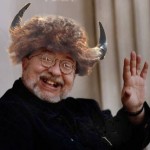In the last 35 years, Daniel Pinkwater has written more than 80 children’s picture books and novels. But he says, “All my books are flawed. The next one is always better. My books are like footprints. They show were I’ve been, not where I am.” Under pressure, Pinkwater admits to being honest with his readers and not showing off for them. But “I don’t try to do all the tricks I might have done with language. I’ve become simpler through the years.” His motto is cleaner, better, more direct art.
His newest novel, Looking for Bobowicz (HarperCollins, 2004) received several outstanding reviews, but Pinkwater isn’t satisfied because he says, “The sequel, The Artsy Smartsy Club [HarperCollins, TBA], is so much better.” He’s calculated that it will take him another 30 years to produce a book he can really respect. To ensure he’s around that long, he’s turned his concept of cleaner, better, more direct art onto himself. The 62-year old author has “cleaned up his act with diet and exercise.”
According to Pinkwater, “children make better readers than adults.” They read with an intensity he finds compelling. “They read as carefully as I write.” During school visits, kids quiz Pinkwater about his books, and when he can’t remember the details they don’t believe he wrote them. “I get letters saying I have read your book 17 times. If you’re an adult novelist and you get that letter, you should be afraid. You’re being stalked. But kids always read them 17 times.”
Pinkwater grew up in Los Angeles and Chicago and received a degree in fine art from Bard College in the Hudson Valley area of New York. He went to the city to crack the art world as a printmaker and figured he’d arrived when he landed a one-man show. He continued painting, showing, and (as he puts it) “sucking up to clients” until he met a children’s book editor at a party who suggested he could illustrate children’s books. All he needed to do was find a writer. “I didn’t know any writers even though I was a bit of a bohemian. I was brought up better than that.” So he wrote his own stories—a short leap from his junior high school days writing MADD Magazine-style pieces to make his friends laugh.
Now, Pinkwater writes books he would have liked as a child. Ideas come 60 a minute, but he admits most of them stink. The trick is in developing the idea. For example, in Fat Men From Space (Dodd, Mead & Company, 1977), Pinkwater started with a kid who goes to the dentist to get a filling. “What if the filling receives radio signals? A cool situation, but not a story. What if the signals are from outer space and describe an alien invasion? We have a story!”
Although Pinkwater used to illustrate his own books, his wife, Jill, has now taken over that task. Married for 34 years, Pinkwater jokes “it’s been hell. But she’s such a great artist and such a great cook, and she’s so beautiful, and she’s got red hair that I overlook her faults.” Jill’s polar bears from the Irving and Muktuk series and the Larry series are Pinkwater’s favorite characters because Jill draws them so wonderfully. “She draws the way I would draw if I could really draw. The best thing is when she lets me make suggestions!”
In addition to writing, Pinkwater is a regular commentator on National Public Radio’s “All Things Considered” and “Weekend Edition Saturday.” According to Pinkwater, “NPR has very smart people working in production. They find the best talent.” When contacted by a breathless young intern who asked if he’d like to be commentator he said, “I always thought I should be!”
Pinkwater’s irreverent sense of humor appeals to kids because it’s off-the-wall. If you communicate with him via the Forum link on his website, ask him to tell you about the time he performed on the harpsichord for the Empress Maria Theresa (archduchess of Austria and queen of Hungary and Bohemia in the mid-1700s). Using the alias Wolfgang, he was a child prodigy exhibited before royalty all over Europe. Had he stuck with it, he would have written all the music there was to write. If you believe that, he’ll tell you another one!


